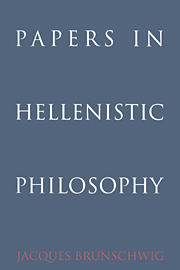Book contents
- Frontmatter
- Contents
- Acknowledgements
- Preface
- I EPICUREANISM
- II STOICISM
- 3 Remarks on the Stoic Theory of the proper noun
- 4 Remarks on the classification of simple propositions in Hellenistic logics
- 5 The conjunctive model
- 6 The Stoic theory of the supreme genus and Platonic ontology
- 7 On a Stoic way of not being
- 8 Did Diogenes of Babylon invent the Ontological Arugument?
- III SCEPTICISM
- Bibliography
- Index of subjects
- Index of names
- Index of passages cited
3 - Remarks on the Stoic Theory of the proper noun
Published online by Cambridge University Press: 25 October 2009
- Frontmatter
- Contents
- Acknowledgements
- Preface
- I EPICUREANISM
- II STOICISM
- 3 Remarks on the Stoic Theory of the proper noun
- 4 Remarks on the classification of simple propositions in Hellenistic logics
- 5 The conjunctive model
- 6 The Stoic theory of the supreme genus and Platonic ontology
- 7 On a Stoic way of not being
- 8 Did Diogenes of Babylon invent the Ontological Arugument?
- III SCEPTICISM
- Bibliography
- Index of subjects
- Index of names
- Index of passages cited
Summary
There is not much chance of being wrong when one declares the theory of the proper noun to be positioned at a strategic crossroads in Stoic thought. It is fair to say (with the modulated reservations that such a declaration demands) that it was the Stoics who invented the grammatical category of the proper noun and it was by no mere chance that they did so. Their logic, unlike Aristotle's, allots to the singular proposition a place of fundamental importance. Their ontology attributes to every existent an individuality which makes it, in principle, discernible from every other; their theory of knowledge extends to representations the discernibility of the objects that they represent. That is to say, by tugging on the metaphorical string of the proper noun, one could easily unravel the entire skein of Stoicism, thereby vindicating the constant claims of systematicity that partisans of the doctrine were in the habit of advancing. In the limited space available here, I shall do no more than sketch in just such a claim on my own behalf.
The framework for the invention of the proper noun is the theory of the parts of discourse which the Stoics did not themselves invent but to which they attached great importance and also made decisive contributions.
- Type
- Chapter
- Information
- Papers in Hellenistic Philosophy , pp. 39 - 56Publisher: Cambridge University PressPrint publication year: 1994



